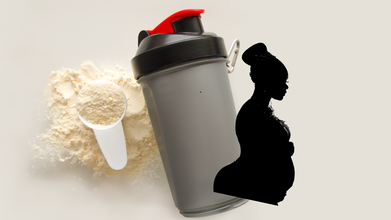- Health Conditions A-Z
- Health & Wellness
- Nutrition
- Fitness
- Health News
- Ayurveda
- Videos
- Medicine A-Z
- Parenting
- Web Stories
Is Protein Powder Safe For Pregnant Women?

Credits: Canva
Pregnancy is a time when woman need to be extra careful with what they consume. There are always endless recommendations, and thus sometimes it could be difficult to separate fact from fiction, especially when it comes to protein intake. While protein is essential for everyone, however, during pregnancy, it plays a critical role in maternal health and fetal development.
Why Does It Matter?
A recent study has shown that lead has been found in popular protein powder, and the highest found in whey protein powder, or the plant-based protein powders. This is concerning, as protein are essential during pregnant as they contribute directly to the growth and development of the baby.
Proteins are made up of amino acids- body's building blocks. These amino acids help build and repair muscle and create hormones and produce enzymes.
A study published in Advances in Nutrition highlights that pregnancy is an “exceptional stage of life defined by rapid growth and development.” From just weeks after conception, the body adjusts protein metabolism to support fetal growth. Most protein deposits occur in the third trimester, reinforcing the importance of consistent protein intake throughout pregnancy.
Read: High Levels Of Lead Found In Protein Powders And Shakes, Reveals Consumer Reports
How Much Protein Do You Need?
Recommended protein intake usually varies by country, for instance in Australia, the RDI for pregnant women s around 60 grams per day, whereas 46 grams for non-pregnant women.
Are Protein Powder Safe During Pregnancy?
Yes, they are safe, unless they contain lead and other contaminants, which must be checked by the list published by the Consumer Reports and your local physician, gynaecologist and nutritionist.
There are several plant-based proteins that have the highest lead content in them, they are:
- Whey protein: Derived from milk; contains all essential amino acids. Not ideal for lactose-intolerant individuals.
- Hemp protein: Plant-based, safe for vegetarians and vegans.
- Pea protein: Plant-based, rich in branched-chain amino acids (BCAAs).
- Rice protein: Vegan-friendly, made from brown rice.
What Is An Alternative?
The RDI could be achieved with a manageable and balanced diet that includes:
Complete proteins: Lean meats, fish, eggs, dairy
Combined plant proteins: Legumes with grains or nuts (e.g., peanut butter on whole-grain toast)
A diet rich in fruits, vegetables, whole grains, legumes, nuts, and moderate protein sources, whether plant-based or animal, supports both maternal and fetal health. Weight gain is expected during pregnancy, and incorporating protein helps ensure that gain is nutrient-dense. For individual guidance, consulting a GP or dietitian is recommended.
Other alternatives like protein bars, or homemade bars, which use dates, nut butter, and seeds could be a healthier option as they do not contain added sugar.
Should Parents Limit Social Media For Teens? New Study Shows It Is Lowering Their Memory Score

(Credit-Canva)
Scientists have found that kids' social media use might be slowing down their brain power. A new study says that spending time on these apps could be hurting how well a tween's mind develops. This research shows that the more time kids spend on platforms like Instagram or TikTok, the worse they might do on school-related tasks later on.
How Does Social Media Affect Our Health?
The researchers found that children aged 9 to 13 who used social media more often did worse on tests that measured skills like reading, memory, and language. They were tested on these abilities two years after the study began. The results were published in a major medical journal called the Journal of the American Medical Association.
The lead scientist, Dr. Jason Nagata, explained that even using social media for a short time each day was connected to poorer results on these brain-power tests. He suggested that the brains of young tweens might be extra sensitive to social media. This means parents need to be careful about when they let their kids start using these apps and how much time they spend on them.
How Did Social Media Affect Kid’s Academics?
To figure this out, the researchers looked at information from over 6,500 children across the country. These kids were all part of the Adolescent Brain Cognitive Development (ABCD) Study, which is the biggest study ever done in the U.S. to track how children's brains grow over time. They sorted the kids into groups based on their social media use:
- Over half (58%) of the kids barely used social media at all.
- More than a third (37%) were using social media for about one extra hour every day by the time they turned 13.
- A small group (6%) were using social media for up to three extra hours a day by age 13.
The children's brain power was measured using special tests created by the National Institutes of Health, which tested things like how well they remember information and understand language. The study found a clear, but small, drop in the test scores for kids who used social media.
- Kids who used social media for just one extra hour a day scored about 1 to 2 points lower on their memory and reading tests.
- Kids who used social media for up to three extra hours a day saw a bigger drop, scoring as much as 4 points lower.
Why Is Important To Restrict Your Child’s Social Media Usage?
Dr. Nagata explained that even though these differences seem small, they are very important because they were seen again and again across the children. Since reading and memory are the most important skills for learning, even these small dips in scores, when seen across thousands of kids, could be a problem for education as a whole.
The scientists think the problem is that social media is so fun and engaging that kids might choose to scroll instead of doing homework or reading. This time shift could be hurting their learning. The researchers stress that creating good screen habits early on can help protect a child’s learning and brain growth.
The results of this study support actions already being taken, such as schools trying to limit student phone use during the day. The findings also provide backing for bigger changes, like making the age limits for social media access even stricter than they are now.
However, the researchers want to be clear about one thing: because they were only watching the kids' behavior (it was an observational study), they can't say for sure that social media causes the lower test scores. They can only say that there is a clear association between the two.
Can Inflammation Affect Fertility? Expert Helps Us Understand the Hidden Connection

Credits: Canva
Chronic inflammation in the body could interrupt with hormones, as well as reproductive hormones and it could also lead to interfere with embryo implantation. As a result, conception could become more difficult for both men and women. Health and Me spoke to expert, Dr Varsha Agarwal, who is a consultant and fertility & IVF specialist at Motherhood Fertility & IVF, Noida.
Here's what she explained.
The Delicate Balance Of Fertility
Fertility depends on a delicate balance of hormones, she noted. Healthy reproductive organs, and proper immune functions are among the most important functions of the human body that results in healthy fertility. However, when the body experiences inflammation, explains Agarwal, this balance can be disrupted. Many individuals struggling with infertility may not even realize that inflammation could be one of the underlying conditions.
Inflammation is the body’s natural response to injury or infection, but when it becomes chronic, it can create an internal environment that isn’t ideal for reproduction. According to Dr. Agarwal, “Chronic inflammation can interfere with hormonal signals, damage reproductive tissues, and even affect how an embryo implants in the uterus. Over time, this can make conception more difficult for both men and women.”
How Does Inflammation Affect Fertility In Women?
In women, inflammation can impact the ovaries, fallopian tubes, and uterus. It could also cause conditions like endometriosis, pelvic inflammatory diseases (PID), and polycystic ovarian syndrome (PCOS). These conditions are often linked with chronic inflammation and could disrupt ovulation, affect egg quality, and even alter the uterine lining. All of these could make conception more difficult.
Dr. Agarwal explains, “Inflammation in the reproductive organs can lead to scarring or blockages in the fallopian tubes, preventing the egg and sperm from meeting. It can also alter the hormonal environment, which may delay or prevent ovulation.”
Does It Also Impact Male Fertility?
Inflammation doesn’t discriminate between men or women. Inflammation in the testicular or prostate area can reduce sperm count, motility, and quality, creating challenges in conception. “In men, oxidative stress triggered by chronic inflammation can damage sperm DNA and reduce fertility potential,” adds Dr. Agarwal.
Lifestyle factors such as poor diet, obesity, smoking, stress, lack of sleep, and exposure to toxins can all worsen inflammation and hormonal imbalances. Over time, these factors can contribute to infertility in both sexes.
What Can Be Done To Manage Inflammation?
Dr Agarwal recommends lifestyle measures like:
- Consuming anti-inflammatory foods: fresh fruits, vegetables, whole grains, nuts, fatty fish rich in omega-3. Avoid processed and fried foods.
- Maintain a healthy weight by exercising daily
- Stay active
- Quit smoking
- Prioritize sleep
- Reduce stress by practicing mindfulness and meditation
“If conception isn’t happening despite regular attempts, it’s vital to consult an expert,” advises Dr. Agarwal. “Get screened for underlying inflammatory or autoimmune conditions early. With timely medical guidance and healthy lifestyle changes, it’s possible to reduce inflammation, restore hormonal balance, and improve fertility naturally and safely.”
Can You Stop Your Kid From Being Allergic To Peanuts? New Study Shows It May Be Possible With These Steps

(Credit-Canva)
Allergies are a major concern for parents, as they can develop at any time. Parents often worry about being in a situation where they cannot help their child. This leads them to be very cautious of certain foods like peanuts, which is a common allergen, according to the American College of Allergy, Asthma and Immunology.
However, there may be a way to reduce the risk of your child developing peanut allergy. According to a new study published in the Pediatrics journal, giving pediatricians a few simple tools significantly increased how often they recommended introducing peanuts to babies early.
This finding is a major victory because it shows a clear way to prevent peanut allergies, which are becoming more and more common in children. This important study was conducted by experts from Northwestern University and Ann & Robert H. Lurie Children's Hospital of Chicago.
What Age Should Kids Start Consuming Peanut Products?
As you may know, allergies happen when your immune system overreacts to something that is usually not harmful. Things like pollen, pet dander and certain foods like peanuts. Some symptoms of allergies can range from sneezing, a runny nose, vomiting or even difficulty breathing.
Harvard health explains that you can develop allergies at any age. Since 2017, official national medical guidelines have told doctors to recommend giving infants peanut-containing foods when they are around 4 to 6 months old. The reason for this early introduction is to actively lower the baby's risk of developing a peanut allergy.
Despite these clear rules, surveys showed that most pediatricians were not consistently following the guidelines. This is a serious issue because peanut allergy is the most common food allergy in children, and it now affects over 2% of all children in the United States, a number that is currently increasing.
How Can We Lower The Rate Of Peanut-Allergies?
The new study tested an intervention where doctors were given three easy-to-use tools:
- A short training video for the doctor's office staff to watch.
- Electronic health record (EHR) prompts—these are reminders that automatically pop up on the computer screen during a check-up.
- Handouts with clear information for the baby's parents.
The results were impressive: in the clinics that used these tools, doctors followed the guidelines 84% of the time for low-risk babies (those without existing eczema or egg allergy). In contrast, the clinics that did not use the tools only followed the guidelines 35% of the time. This means that babies whose doctors used the tools were nearly 15 times more likely to receive this important allergy prevention advice.
What Role Do Doctors Play To Lower Peanut Allergies?
Lead author Dr. Ruchi Gupta emphasized that this extra support for doctors is absolutely essential. Visits for 4- and 6-month-old babies are often very busy, with many things for the doctor to cover in a short time. The simple tools help doctors provide clear, consistent guidance to families despite this time pressure.
Dr. Gupta shared her hope: "We want these conversations to help parents feel confident and secure about introducing peanut products early." The ultimate goal is to use this effective prevention strategy to stop the trend of rising food allergies in the U.S. and protect children's health.
© 2024 Bennett, Coleman & Company Limited

